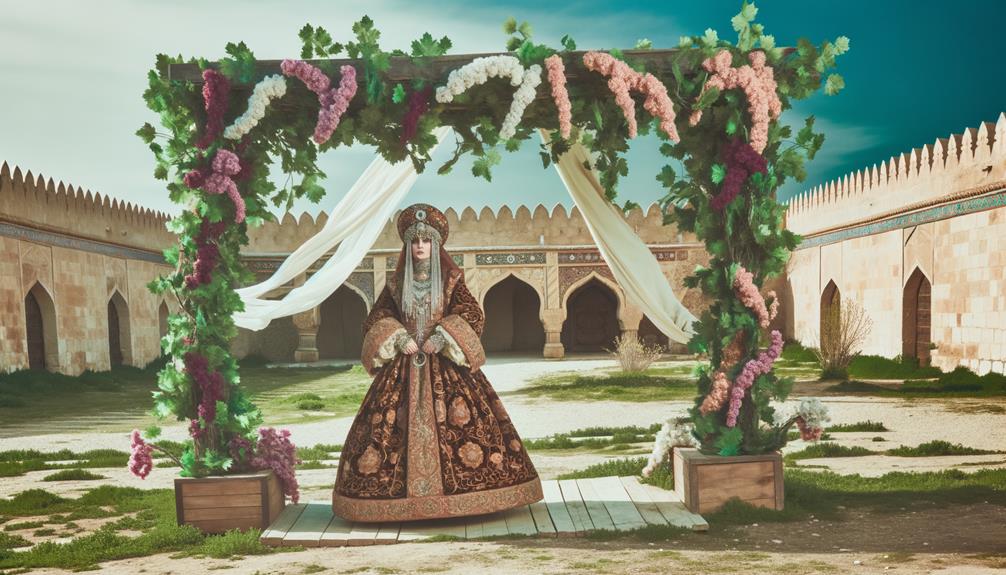Meaning of the Name Vashti
The name Vashti, derived from ancient Persian, means 'beautiful' or 'best'. Historically, Queen Vashti is renowned for her defiance against King Ahasuerus in the Book of Esther, leading to her subsequent dethronement.
This story, set in the Achaemenid Empire, underscores power dynamics and gender roles in ancient Persia. The name Vashti, rooted in the Old Persian term 'vahišta', reflects a cultural and linguistic richness.
Her narrative continues to influence discussions on female autonomy and resistance. For those intrigued by historical and cultural insights, Vashti's story holds a deeper significance.

Key Takeaways
- The name Vashti likely means 'beautiful' or 'best' in Persian.
- Vashti is a Persian name with roots in the Old Persian word 'vahišta.'
- The name Vashti signifies excellence and virtue in cultural narratives.
- Vashti's story in the Book of Esther symbolizes resistance and autonomy.
- The name Vashti holds historical and cultural significance in ancient Persia.
Historical Background
The name Vashti, rooted in the ancient Persian language, carries significant historical connotations, particularly through its association with the Persian queen mentioned in the biblical Book of Esther. Vashti, the wife of King Ahasuerus (Xerxes I), is a pivotal figure whose refusal to appear before the king's banquet led to her dethronement.
This act of defiance is historically situated within the Achaemenid Empire, reflecting the complex dynamics of royal court life and gender roles in ancient Persia. Her story, although brief in biblical texts, has left an indelible mark on cultural and religious narratives.
The historical context of Vashti's tale underscores the interplay between power, authority, and individual agency in ancient Near Eastern societies.
Etymology
The name Vashti is believed to have its roots in the Persian language, where it is thought to mean 'beautiful' or 'best.'
Biblical references to Queen Vashti in the Book of Esther highlight her significance in Jewish history and literature.
Understanding the cultural implications of her name requires an exploration of its linguistic origins and the societal values it reflected.
Persian Language Roots
Vashti's name likely originates from Old Persian roots, reflecting the linguistic and cultural heritage of ancient Persia.
The name 'Vashti' is believed to derive from the Old Persian word 'vahišta,' which translates to 'best' or 'excellent.' This linguistic connection underscores the high regard in which the name was held, resonating with the Persian tradition of assigning meaningful and auspicious names.
The Old Persian language, part of the Indo-Iranian language family, notably influenced the lexicon of names in the region, embedding specific cultural and social values.
Understanding the etymology of Vashti's name offers a glimpse into the linguistic intricacies and societal norms of ancient Persia, highlighting the profound impact of language on identity and heritage.
Biblical References
In addition to its Persian roots, the name Vashti also holds significance within Biblical texts, where it is famously associated with Queen Vashti, a notable figure in the Book of Esther.
Her story is set in the Achaemenid Empire under King Ahasuerus, commonly identified with Xerxes I. Linguistically, the name Vashti is thought to derive from the Old Persian 'Vahista,' meaning 'best' or 'excellent.'
In the Biblical narrative, Queen Vashti's refusal to appear before the king and his guests leads to her removal from her royal position, thereby setting the stage for Esther's ascension. This narrative underscores the cultural interplay between Persian and Hebrew histories, emphasizing the etymological and historical importance of the name Vashti.
Cultural Significance
Frequently analyzed, the etymology of the name Vashti reveals its roots in Old Persian, where it signifies qualities such as 'best' or 'excellent,' reflecting its historical and linguistic significance. This name embodies a legacy that transcends its biblical origins, resonating with cultural narratives and societal values of excellence and virtue. The linguistic journey of Vashti underscores the interconnectedness of language and cultural identity, offering a window into ancient Persian civilization.
| Language | Origin | Meaning |
|---|---|---|
| Old Persian | Vashtī | Best, Excellent |
| Hebrew | וַשְׁתִּי | Beautiful |
| Modern Usage | Various | Integrity, Respect |
| Cultural Context | Persia, Israel | Historical Significance |
This table illustrates the linguistic and cultural layers embedded in the name Vashti, emphasizing its enduring appeal.
Biblical References
The name Vashti is prominently featured in the Book of Esther, where she is depicted as the queen of Persia who defies King Xerxes' command. Her refusal to appear before the king and his guests during a lavish banquet results in her dethronement, a pivotal event that sets the stage for Esther's rise.
Historically, Vashti's act of defiance is seen within the context of Persian royal customs and the absolute authority of the king. Linguistically, the name Vashti is believed to originate from Old Persian, meaning 'best' or 'excellent.'
This biblical reference provides an essential narrative framework for understanding royal dynamics and gender roles within ancient Persian society, contributing to the broader thematic elements of the Book of Esther.
Cultural Significance
Vashti's narrative transcends biblical scripture, influencing discussions on gender roles and authority in various cultural contexts throughout history. Her defiance of King Ahasuerus' command has been emblematic of a broader resistance against patriarchal constraints.
In Persian culture, her name may signify beauty or goodness, yet Vashti's story is often invoked in feminist discourse to illustrate early acts of female autonomy. Linguistically, the name Vashti implies nobility and strength, attributes that resonate in diverse societies.
Historically, her refusal has been interpreted as a pivotal moment that challenges traditional power dynamics. Consequently, Vashti's character continues to inspire debates on the complexities of obedience, power, and the role of women within both ancient and contemporary frameworks.
Literary Interpretations
Exploring Vashti's character through literary interpretations reveals a nuanced understanding of her defiance, often casting her as a symbol of resistance and autonomy in various textual analyses. Scholars have approached her story from multiple perspectives:
- Feminist Critique: Vashti's refusal to appear before King Ahasuerus is seen as an assertion of personal agency against patriarchal demands.
- Historical Context: Her actions have been interpreted within the socio-political landscape of ancient Persia, reflecting broader themes of power and governance.
- Linguistic Analysis: The etymological roots of Vashti's name, posited to mean 'beautiful' or 'best,' add layers of meaning to her narrative, suggesting inherent worth and dignity.
Each perspective adds depth to our comprehension of Vashti's character and her lasting legacy in literary tradition.
Modern Usage
In contemporary contexts, the name Vashti has seen a resurgence in media and popular culture, often associated with strong, independent characters. This trend aligns with a broader movement in contemporary naming practices, where historical and literary names gain renewed popularity.
Analyzing these patterns reveals a cultural shift towards valuing names with rich historical and narrative significance.
Popularity in Media
The name Vashti has seen a resurgence in various forms of contemporary media, reflecting its enduring cultural and historical significance. In literature, film, and television, this name has been employed to evoke themes of strength and defiance, echoing its Persian origins and biblical roots.
Prominent examples include:
- Literature: Vashti appears in works such as 'The Machine Stops' by E.M. Forster, symbolizing resistance against authoritarian rule.
- Film: In the cinematic world, characters named Vashti often embody intricate, multi-dimensional personalities.
- Television: Modern TV series have introduced characters named Vashti, enriching storylines with their deep cultural background.
This resurgence emphasizes the name's strong resonance and flexibility in various storytelling platforms.
Contemporary Name Trends
Modern usage of the name Vashti reflects a blend of historical reverence and contemporary appeal, making it a unique choice in today's naming conventions. Rooted in Persian history, Vashti was a queen in the Biblical Book of Esther, often symbolizing strength and independence. This historical context adds a layer of depth for modern parents seeking names with substantive heritage.
Linguistically, the name's consonant-vowel structure lends it a melodious quality, enhancing its modern attractiveness. Trends in contemporary naming have shown a resurgence of vintage and culturally rich names, and Vashti fits seamlessly into this pattern. Its rarity further guarantees distinctiveness, appealing to those who desire a name that stands out yet resonates with timeless elegance.
Symbolism
How does the name Vashti encapsulate layers of historical and cultural significance, revealing intricate symbolism within its etymology?
The name Vashti, derived from Persian roots, is often associated with nobility and beauty. Its historical context is enriched by its connection to Queen Vashti from the Biblical Book of Esther, a figure who symbolizes resistance and dignity.
The symbolism of the name Vashti can be distilled into three main aspects:
- Nobility: Reflecting Persian heritage, highlighting the name's royal connotations.
- Beauty: Implied by the name's etymological roots, suggesting appearance and grace.
- Defiance: Embodied by Queen Vashti's refusal to comply with King Ahasuerus's demands, symbolizing strength and autonomy.
Each facet contributes to its rich, multifaceted symbolism.
Name Variations
Understanding the symbolism of the name Vashti invites an exploration of its variations across different cultures and languages, each contributing unique nuances to its historical and etymological tapestry. The name Vashti, rooted in Persian origin, signifies "beautiful" or "excellent." Its variations reflect the diverse interpretations and adaptations throughout history.
| Language/Culture | Name Variation |
|---|---|
| Persian | Vashti |
| Hebrew | ושתי (Vashti) |
| Greek | Αστιν (Astin) |
| English | Vashti |
| French | Vashti |
These variations underscore the name's resilience and adaptability across linguistic landscapes. In Hebrew texts, Vashti retains her original form, while Greek accounts often modify it to "Astin." Such variations reveal the interconnectedness of cultural narratives and the enduring legacy of a name that traverses time and geography.
Conclusion
The name Vashti, steeped in historical grandeur and linguistic intrigue, transcends mere nomenclature. Its biblical roots and cultural significance elevate it to a symbol of defiance and strength.
The etymology unfolds layers of ancient civilizations, while literary interpretations breathe life into its timeless relevance.
Modern usage continues to echo its illustrious past, making Vashti a name that resonates with unparalleled depth and historical resonance, an epitome of enduring legacy and formidable presence.






